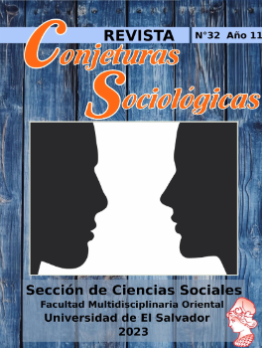Autonomía Universitaria
Resultados para la Universidad de El Salvador
Palabras clave:
Universidad, Autonomía, Educación superior, Desarrollo universitarioResumen
Se conoce, que la región Centroamérica se independizo de la monarquía española el 15 de septiembre de 1821, el caso específico del Estado de El Salvador, es declarado soberano e independiente en febrero de 1841, año particular, ya que se decreta la creación y apertura de la Universidad de El Salvador, más conocida como la UES. El objetivo fundamental de este trabajo, es dar a conocer a la sociedad, la lucha incesante que sostuvieron reconocidos intelectuales de El Salvador para lograr la creación y funcionamiento Autónomo de la UES y a partir de ese logro, manejar la institución teniendo en cuenta su autonomía académica y administrativa, para impulsar sin inconveniente la docencia, investigación y extensión. Este trabajo, se logró concretar mediante la aplicación del método teórico Histórico – Lógico de acuerdo Torres (2019), así como la aplicación del método de revisión y análisis documental propuesto por Solís Hernández (2003). Esto permitió, llevar a cabo la búsqueda y revisión de documentos que describen el contexto histórico de la UES, y generar la evidencia que muestra a la sociedad salvadoreña, que, en efecto, la Universidad de El Salvador goza de su propia autonomía
Descargas
Referencias
Barraza, R. D. (1986). PERFIL HISTORICO DE LA AUTONOMIA. Revista UES - LA UNIVERSIDAD, págs. p.1-12. Obtenido de https://revistas.ues.edu.sv/index.php/launiversidad/article/view/972/896
El Universitario. (2011). 170 años de la UES entre período 1841-2011. (A. M. Alemán, Ed.) El Universitario, No.17, págs. P.1-32.
Flores-Hernández, R. Y. y García-González, M. (2022). Estado actual de la producción científica en la Educación Superior en El Salvador. Revista Atenas, Vol. 4 (60), 14-32.
Garcia, M. G., Mateu, M. M., & Ciciliano, M. A. (2019). Fortalecimiento académico de la Educación Superior Salvadoreña desde la cooperación cubana. Referencia Pedagógica, Vol. 7(No.2. julio-diciembre ), pp.283-298.
Hernández, D. (2017). BOSQUEJO HISTÓRICO DE LA UNIVERSIDAD DE EL SALVADOR. Revista: La Universidad(No.35), p.1-75.
López, S. (2016). Educación Superior Comparada. Tendencias Mundiales y de América Latina y El Caribe. Revista da Avaliação da Educação Superior, Volumen 21(No.1), 13 - 23. https://doi.org/DOI: http://dx.doi.org/10.1590/S1414-40772016000100002
Macal, M. F. (1976). Historia de la Universidad De El Salvador. En M. F. Macal, & A. D. CENTROAMERICANOS (Ed.). Revistas Académicas. Universidad de Costa Rica. Obtenido de https://revistas.ucr.ac.cr/index.php/anuario/article/view/3843
Melgar Brizuela, J. F. (2020). Historia de las Cátedras Científicas De La Universidad De El Salvador, 1841-1890: De La Ilustración Al Positivismo. Tesis Doctoral, Universidad Centroamericana José Simeón Cañas, Filosofía, Antiguo Cuscatlán, El Salvador, C.A.
Millares Reyes, E. (1980). La Universidad y la Reforma en América Latina. Bogota. p.113. Recuperado el 29 de Noviembre de 2022, de https://www.bibvirtual.ucb.edu.bo/opac/Record/175001
Nisbet, R. (1986). LA IDEA DE PROGRESO. Revista Libertas, Vol. II(No. 1), págs. 1-30. Obtenido de https://www.eseade.edu.ar/files/Libertas/45_2_Nisbet.pdf
Ruiz Calleja, J. M. (2008). La gestión universitaria y el rol del profesor. Universidad de Santander, P 7-8.
Ruiz Ortiz, F. E. (2006). Autonomía Universitaria. Estado y universidad. 20. Obtenido de http:///Downloads/admin-journal-manager-revista-la-universidad-2c3.pdf
Salazar, J. M. (2011). Marco conceptual del Aseguramiento de la Calidad. En CINDA, Modelos de Aseguramiento de la Calidad en la Educación Superior (págs. 14-71).
Solís Hernández, I. A. (2003). El análisis documental como eslabón fundamental para la eficiencia de los servicios de información. (D. I. Vizcaya, Ed.) p.187. Obtenido de https://www.monografias.com/trabajos14/analisisdocum/analisisdocum
Torres Miranda, T. (2019). En defensa del método histórico-lógico desde la Lógica como ciencia. Scielo, p.12. https://doi.org/https://orcid.org/0000-0003-0660-7009
UNESCO. (1998). Declaración Mundial sobre la Educación Superior en el siglo XX: Visión y Acción. UNESCO.
UNESCO. (2020). El Acceso de los más Desfavorecidos a la Educación Superior es un Desafío a Enfrentar en América Latina y El Caribe. IESALC - UNESCO. Obtenido de https://www.iesalc.unesco.org/2020/11/18/el-acceso-de-los-mas-desfavorecidos-a-la-educacion-superior-es-un-desafio-a-enfrentar-en-america-latina-y-el-caribe/
Valle, V. M. (1991). La educación universitaria en El Salvador Un espejo roto en los 80's. (C. CINAS: Centro de Investigación y Acción Social El Salvador, Ed.) Realidad: Revista de Ciencias Sociales y Humanidades(No.19-20), p. 255-279. https://doi.org/https://doi.org/10.5377/realidad.v0i19-20.5346
Villoro, L. (1972). El Regimén Legal y la Idea de la Universidad. (B. d. México, Ed.) DESLINDE: Cuadernos de Cultura Política Universitaria, Departamento de Humanidades, Dirección General de Difusión Cultural, UNAM. No.2, p.2-5. Obtenido de https://dokumen.tips/download/link/el-regimen-legal-y-la-idea-de-la-universidad-luis-villoro
Publicado
Número
Sección
Licencia

Esta obra está bajo una licencia internacional Creative Commons Atribución-NoComercial 4.0.
Los autores continúan como propietarios de sus trabajos, cediendo de manera no exclusiva los derechos de difusión a la Revista Conjeturas Sociológicas bajo los estándares de la Licencia Creative Commons Atribución No Comercial 4.0 Internacional (CC BY NC 4.0).





